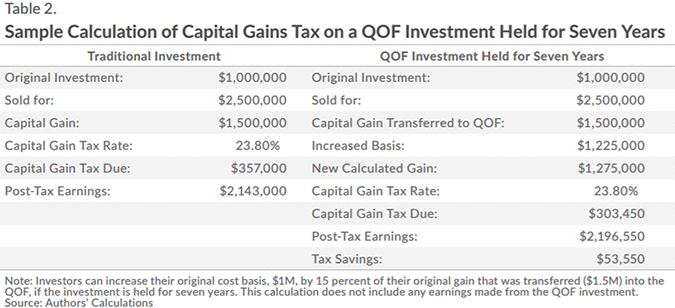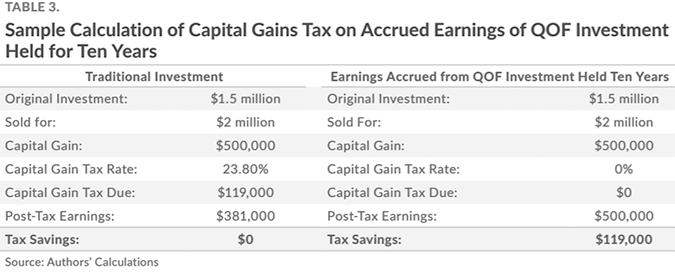CKBlog: Strategies
Friday, February 01, 2019
Do Good. Own Real Estate. And Save Taxes? A Primer on Opportunity Funds.
by Steve Haberstroh, Partner
People love real estate. People hate paying taxes. So when news began circulating about a legal way to both invest in real estate AND substantially reduce long-term capital gains taxes, we were all ears. Skeptical, but all ears. Below is what we have found out thus far.
Let’s say you own stock with a huge unrealized capital gain (I know, hard to imagine given last year’s market). Maybe you bought Amazon in the early 2000s or inherited low basis shares of Walmart stock from a relative. Maybe you joined a tech company in its early days, were paid in stock, and your shares are now worth millions. Or your family is considering selling a piece of real estate or business they’ve owned for generations. In each of these cases, paying capital gains taxes on the sale may be a deterrent for you exiting the position and realizing the long-term gain even if it makes sense given your overall financial objectives. Enter Opportunity Zones.
Opportunity Zones
As part of the Tax Cuts and Jobs Act of 2017, the Treasury Department rolled out a map of so-called Opportunity Zones. According to the IRS, “an Opportunity Zone is an economically distressed community where new investments, under certain conditions, may be eligible for preferential tax treatment.” Ooooh, tell me more!
The IRS goes on, “Opportunity Zones are designed to spur economic development by providing tax benefits to investors ... ” Ok, so I can invest in real estate, potentially reduce taxes AND help those living in distressed areas? Everybody say it with me, “God bless the IRS!”
The potential tax benefits can be categorized in two stages:
- Tax Deferral:
Investors can defer capital gains tax by investing in a Qualified Opportunity Fund (QOF) until the earlier of the date on which the investment in a QOF is sold or exchanged, or December 31, 2026. - Tax Reduction:
- Tax Reduction on Original Asset Sale: If the QOF investment is held for longer than five years, there is a 10% reduction of the deferred gain. If held for more than seven years, the 10% becomes 15%.
- Tax Reduction on QOF Investment: If the investor holds the investment in the Opportunity Fund for at least ten years, the investor is eligible for an increase in basis of the QOF investment equal to its fair market value on the date that the QOF investment is sold or exchanged.
(All the above was paraphrased from the IRS website: Opportunity Zones Frequently Asked Questions. Please consult with your tax advisor. Do not rely on my paraphrasing when filing your returns!)
Confused? Maybe pictures help. The charts below are courtesy of the Tax Foundation, an 80-year-old tax policy non-profit. I highly recommend their report: Opportunity Zones: What We Know and What We Don’t.
Let’s say you inherited Grandma’s house on the Vineyard for $1 million. You decide to sell it for $2.5 million and invest the proceeds in a QOF.

In the hypothetical example, the seven-year deferral of the sale proceeds results in a tax savings $53,550. Awesome! And saving over fifty grand in taxes may even help offset the guilt for selling the setting of all your childhood memories!
Feel like offsetting more guilt—errr taxes? Look at the impact of staying invested in the QOF for 10 years (assuming the QOF performs well of course). Another chart courtesy of the Tax Foundation:

In this example, assuming the QOF resulted in a $500,000 capital gain and you held it for 10 years, the tax savings would be $119,000 as compared to a similar return in a Non-Qualified Zone investment. Add the $53,550 thousand of tax savings on the original sale of Grandma’s house to the $119,000 saved on the subsequent QOF investment, and you have saved $172,550! Who needs the actual house when you have Polaroids?!
Ok, there were many assumptions in the example above. First, lucky you for inheriting a multi-million-dollar asset! But it also assumes you sell the Vineyard property for a gain, the investment in the QOF was successful (many won’t be), you held the investment for the required time and most importantly, you worked with a qualified CPA who understands the regulation and complied with the regulation. No easy task! Making money and savings in taxes with QOF certainly are not guaranteed.
Ready to Invest in a Distressed Zone?
To qualify, the investment must substantially improve the property. The IRS defines this as making equity improvements equal to the original investment within a 30-month period. So if you directly purchase an old warehouse for $1 million, you will need to invest an additional $1 million over the next 30 months in capital improvements in order to qualify for the tax savings. You cannot simply buy an existing commercial property, collect rent for ten years, and hope to take advantage of this plan.
Likewise, if instead of doing the heavy lifting yourself you invest into a QOF, the fund manager will need to invest at least the amount of their original purchase amounts into improving each of the properties in the fund. If the fund uses $100 million to purchase distressed properties, they will need to invest at least an additional $100 million into improving the properties in order to qualify for tax benefits.
Bottom line is the regulations are complex, so if you are making direct investments into distressed properties on your own, please check with your CPA to make sure your plans are compliant. If you don’t want to get your hands dirty and decide to invest into a fund structure, do proper due diligence on the fund, its managers, and their strategic plans. We can help with this.
How are we evaluating this opportunity for clients?
First, any time you mix new tax rules with private investments, our fraud radar is on high alert. There will be plenty of bad actors hawking illegitimate Opportunity Funds. It’s likely that many good actors will prove to be bad investors in this space. It is imperative to dig deep when presented with these opportunities.
Second, it is never prudent to make investment decisions based solely on tax benefits. The investment should have merit on its own without factoring potential tax benefits.
Third, if our client has no experience in real estate development, we would urge them to partner with or invest alongside an experienced developer or real estate operator who is ALREADY doing business in these zones. We have been evaluating funds/operators that fit this criterion.
Lastly, it is imperative that our clients work with a qualified CPA to make sure they are complying with the regulations. Have I made that point yet? Don’t mess with the IRS!
Other questions we’ll be asking:
- How will this new investment in a QOF affect the rest of your investments? For instance, do you already have substantial real estate exposure?
- Ten years is a long time. Do you have sufficient liquidity outside of this investment to fund your lifestyle and financial objectives?
- What control, if any, do you have with this QOF? Suppose the manager of the fund receives an offer to buy properties he cannot refuse and decides to sell the investment prior to hitting the 5, 7 and 10 year mark? In this case, you may miss the tax benefits of the QOF. Do you have any powers to influence this decision? This is precisely why you need to approach these based on the merits of the investment and not simply for tax benefits.
Bottom line is if you comply with the regulations, this may be a perfectly legal way for your family to reposition assets in a tax-efficient manner. Whether it makes sense for you is a complex puzzle. One that requires bringing several of your trusted advisors to the table. We are happy to coordinate a meeting with you, your CPA, Estate Planner, and other trusted advisors to evaluate the opportunity.
In the meantime, please enjoy your last moments in the Vineyard house.
If you would like to learn more about Opportunity Funds, I can be reached at .(JavaScript must be enabled to view this email address).




